It’s worth quoting Greil Marcus at length in this regard:
“[I]n the beginning, punk was indeed a sort of secret society, dedicated not to the guarding of a secret but to its pursuit, a society based on a blind conviction that there was a secret to be found. Was it that once the secret was seemingly discovered, once punk became an ideology of protest and self-expression – once people knew what to expect, once they understood just what they would get when they paid their money, or what they would do to earn it – the story was ready for its footnotes? In the United States, primitive enclaves had formed across the country (nightclubs, fanzines, record stores, a half-dozen high school students here, a trio of artists there, a girl locked in her room staring at her new haircut in the mirror) though perhaps less in response to the thrill of hearing $10 import copies of the banned ‘Anarchy in the UK’ single than to newspaper and TV features about London teenagers mutilating their faces with common household objects. Real discoveries were taking place, out of nothing (‘The original scene,’ said a founder of the Los Angeles punk milieu, ‘was made of people who were taking chances and operating on obscure fragments of information.’).” – Souciant
Punk was unformed but searching.
Then later, it became streamlined.
It struggled to escape its rock heritage as protest music, and reconnect with its inner poetry, which wanted more than what life offered.
Punk was initially an orgasmic, messy, uncategorizable cultural explosion of mutually contradictory tendencies. Visually, dayglo pinks and greens (X-Ray Spex) collided with fascist and communist imagery (Sex Pistols) and stark black military surplus (Crass) – or bondage — gear. Meanwhile, guitar-driven rock and roll (Ramones) mixed weirdly with androgynous, keyboard-driven experimentation (The Screamers;) and also, inflammatory and reactionary sentiments (Black Flag’s “White Minority,” or the original version of Siouxsie’s “Love in a Void”) were combined confusingly with Marxist and anti-capitalist motifs (The Dils’ “Class War” or anything by The Clash.) That was why punk was so genuinely scary to the public at large. It was a mess of conflicting imagery and sentiment, all of it intentionally provocative.
After punk died, metal carried on this spirit.
Instead of being confused, it went in a literary direction: aspire to the poetic and epic in life.
For this reason, it is less social, political and concrete, and more spaced out. Hobbits, aliens, zombies, knights and wizards.
It’s worth noting that now metal is trapped between the protest music (Gojira) and that which still aspires (Demoncy).
No Comments “Christian metal,” Led Zeppelin the person, lack of good tour packages, and Benjie’s top 10 EPs. We talk about upcoming possible interviews, lots of gas, and lonely old Benjie after Sawyer graduates. We talk giant bruises, phone attacks during the show, and our upcoming Halloween special. Enjoy this little nugget until we return on Oct. 27th. Keep it METAL!
“Christian metal,” Led Zeppelin the person, lack of good tour packages, and Benjie’s top 10 EPs. We talk about upcoming possible interviews, lots of gas, and lonely old Benjie after Sawyer graduates. We talk giant bruises, phone attacks during the show, and our upcoming Halloween special. Enjoy this little nugget until we return on Oct. 27th. Keep it METAL!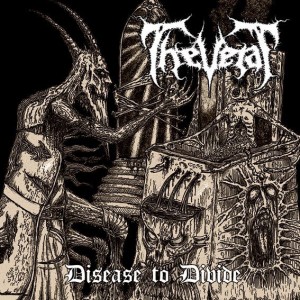 Two of the most epic styles of death metal were the aggressive flood-of-noise NY style exemplified by Incantation, and the melodic style demonstrated by bands like Asphyx or Demigod which added a melodic superstructure to a series of vicious riffs. Without losing its distinctively New World character, Thevetat joins the abrasive and inhuman sounds of early Incantation with an occult melodic sound.
Two of the most epic styles of death metal were the aggressive flood-of-noise NY style exemplified by Incantation, and the melodic style demonstrated by bands like Asphyx or Demigod which added a melodic superstructure to a series of vicious riffs. Without losing its distinctively New World character, Thevetat joins the abrasive and inhuman sounds of early Incantation with an occult melodic sound.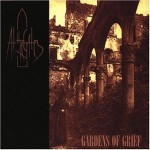
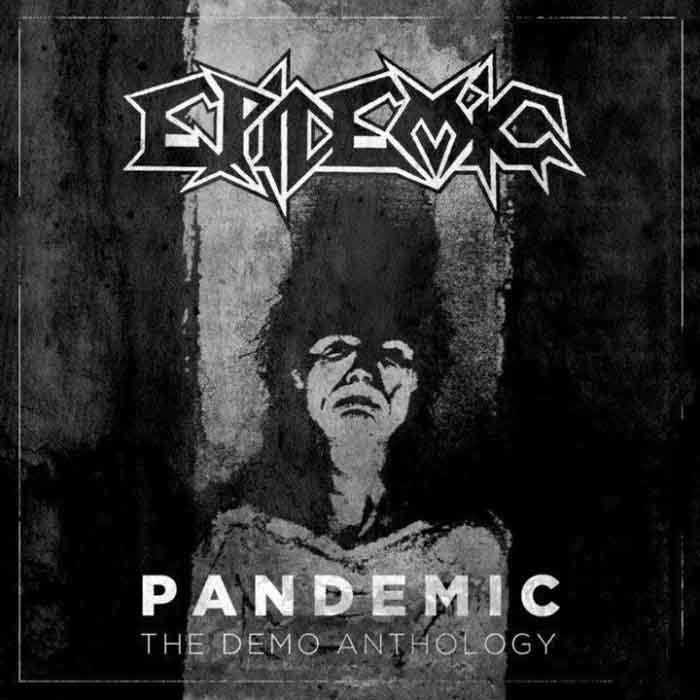
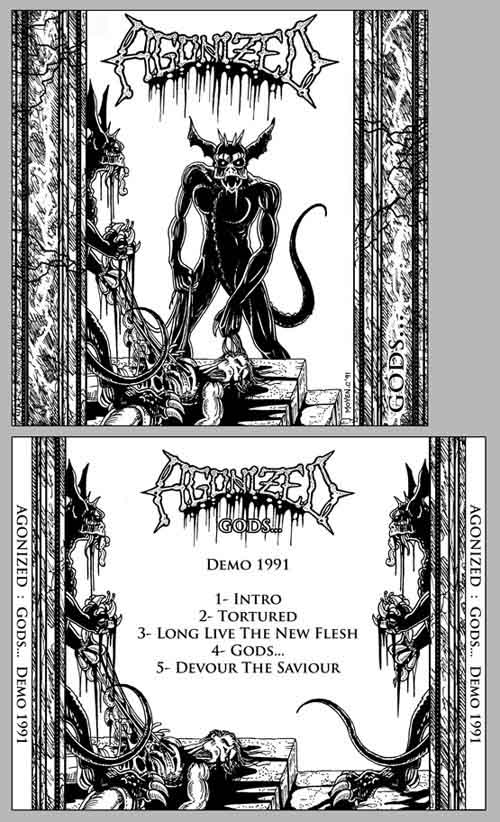 Agonized’s 1991 demo, “Gods…”, has been restored at the local professional studio. Noise has been removed and worst odd tape anomalies filtered but the demo has not been remastered or has its sound changed in any other way. It sounds as muddy and bad and sinister it ever was in 1991.
Agonized’s 1991 demo, “Gods…”, has been restored at the local professional studio. Noise has been removed and worst odd tape anomalies filtered but the demo has not been remastered or has its sound changed in any other way. It sounds as muddy and bad and sinister it ever was in 1991. What is the sign of the modern person? Cause and effect have become reversed: like buying products on a shelf, the modern person expects to see the effect he wants, purchase it, and have substituted that action for causing what he desires.
What is the sign of the modern person? Cause and effect have become reversed: like buying products on a shelf, the modern person expects to see the effect he wants, purchase it, and have substituted that action for causing what he desires.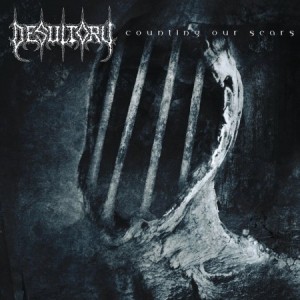 The term “melodic death metal” has lost all meaning with the rise of its postmodern form, which is essentially heavy metal or power metal (speed metal + later heavy metal) with death vocals, played at twice normal speed and using tuning and mode to achieve a melodic sound. The genre often fails because in an effort to deliver lots of those sweet ripping melodic moments, it renders itself uniform and thus passes like sonic wallpaper.
The term “melodic death metal” has lost all meaning with the rise of its postmodern form, which is essentially heavy metal or power metal (speed metal + later heavy metal) with death vocals, played at twice normal speed and using tuning and mode to achieve a melodic sound. The genre often fails because in an effort to deliver lots of those sweet ripping melodic moments, it renders itself uniform and thus passes like sonic wallpaper.
